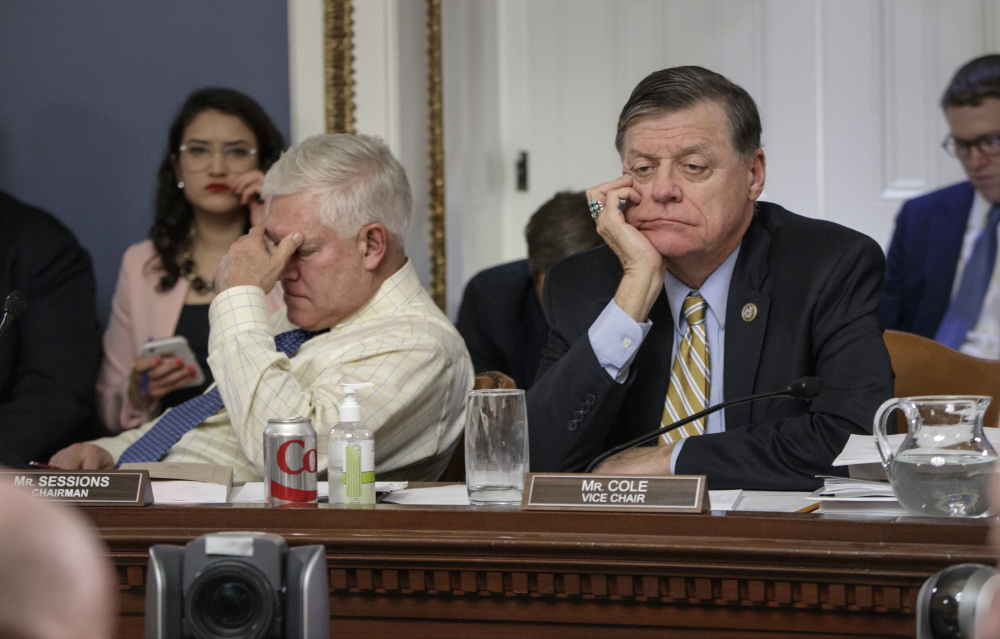WASHINGTON — The fate of the federal government – whether it stays open or shuts down at the end of April – is all up to Congress and President Trump.
Republican and Democratic congressional leaders are optimistic that when they return from their recess the last week of April, they’ll reach a deal and avert a government shutdown by April 28, when legislation that is now funding the government expires.
Yet there are a number of issues, including the White House’s push for U.S.-Mexico border wall money and Trump’s threat this week to pull some health care funding, that could lead to a budget blowup.
It’s happened before: The longest shutdown, in December 1995-January 1996, lasted 21 days. Conservatives in the House of Representatives prompted a 16-day shutdown in 2013 over opposition to paying for President Obama’s Affordable Care Act.
This year’s showdown is most likely in the House, where Republicans are counting on Democratic support to pass a spending bill because some House conservatives have steadfastly refused to vote for spending bills: “Anything that depends on 216 Republicans is a highly risky proposition,” said Rep. Tom Cole of Oklahoma, a top Republican on the House Appropriations and Budget committees, citing the number needed to pass legislation in the House.
That could, however, mean White House priorities go wanting, for now. Here’s a look at the potential flashpoints:
The wall
The administration is asking for $1.5 billion to start building a wall along the U.S. southern border. Trump promised as a candidate that Mexico would pay for the wall, but the administration has since said U.S. tax dollars will finance it.
The request has support from Trump’s supporters, who note that the short-term spending bill is the first in years not to face a veto threat from Obama. “Republicans were elected to majorities in both chambers and the White House, and it’s time to assert their priorities. That includes building the wall,” said Robert Romano, senior editor at Americans for Limited Government, a conservative advocacy group.
It’s a nonstarter with Democrats: Sen. Bill Nelson, D-Fla., said, “This senator, this caucus, is not going to vote for money for a wall.”
White House press secretary Sean Spicer said the administration would “continue to have conversations with Congress” and was confident the budget would reflect Trump’s priorities.
HEALTH CARE
Renewed mistrust over the failed Obamacare repeal and replace bill
Trump this week threatened to withhold payments owed to health insurers under the Affordable Care Act as a gambit to force Democrats to the bargaining table.
Democratic leadership will insist that the budget package carries language to ensure the subsidies are paid. Democrats “will not negotiate with hostage takers,” said Sen. Ron Wyden of Oregon, the top Democrat on the Senate Finance committee.
Coal miners
A dispute over health care benefits for retired coal miners nearly forced a government shutdown in December. Senate Democrats demanded a permanent extension, but House Republicans agreed to only four months.
Democrats reluctantly accepted the extension but have made it clear they intend to use whatever means they have to get a permanent fix. Senate Majority Leader Mitch McConnell, R-Ky., is expected to play a decisive role.
‘POISON PILLS’
These can take many forms, including efforts to defund Planned Parenthood or undermine the Consumer Financial Protection Bureau, established under Obama. Trump’s budget director, Mick Mulvaney, is also reportedly asking lawmakers to include language that would curtail money for cities that do not enforce federal immigration policy.
Congressional Democrats say such partisan riders won’t pass muster; advocacy groups say they’re keeping watch.
“Congress is going to have only a few days to resolve” the must-pass legislation, said Robert Weissman, president of the nonpartisan group Public Citizen. “It’s an opportunity for things to be done in the dark of night, to be done super quickly without adequate public scrutiny.”
The unknown unknowns
Or, there’s always something.
For instance, bad feelings linger over the “nuclear option,” which Republicans triggered recently to eliminate the 60-vote filibuster threshold for Supreme Court nominees.
Reaching a budget deal “was going to be hard already. This makes it even harder,” said Sen. Chris Murphy, D-Conn., a member of the Senate Appropriations Committee. “You ultimately have to have Republicans and Democrats working together in order to pass an appropriations package. This doesn’t help relationships across the aisle.”
It could work the other way, said Sen. Roy Blunt, R-Mo., a top Senate appropriator, who called the budget talks “an opportunity to come back together now and get something done and move forward.”
“While I’m confident we will get it done, I don’t like waiting until the last week,” Cole of Oklahoma said. “When you wait until the last minute, something can always go wrong.”
Send questions/comments to the editors.



Success. Please wait for the page to reload. If the page does not reload within 5 seconds, please refresh the page.
Enter your email and password to access comments.
Hi, to comment on stories you must . This profile is in addition to your subscription and website login.
Already have a commenting profile? .
Invalid username/password.
Please check your email to confirm and complete your registration.
Only subscribers are eligible to post comments. Please subscribe or login first for digital access. Here’s why.
Use the form below to reset your password. When you've submitted your account email, we will send an email with a reset code.